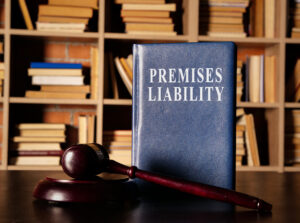
What Is Premises Liability?
Premises liability refers to the legal responsibility property owners (or those in control of a property) have when someone is injured due to unsafe conditions on their premises.
Common examples of premises liability cases in Massachusetts include:
- Slip and falls on ice, spills, or wet floors
- Uneven sidewalks or broken stairs
- Poor lighting or inadequate security
- Dog bites
- Snow and ice accidents
- Injuries in apartment buildings or rental properties
- Swimming pool or playground accidents
How Massachusetts Law Treats Premises Liability
In Massachusetts, property owners owe a duty of reasonable care to all lawful visitors. That means they must keep their property in a reasonably safe condition and either repair hazards or warn people about them.
Unlike some states that still follow the “invitee vs. licensee” rule, Massachusetts law treats most lawful visitors similarly when it comes to duty of care. However, trespassers are generally owed a lower duty, with special exceptions made for children under the “attractive nuisance doctrine.”
One unique aspect of Massachusetts premises liability law is the “notice requirement” — to succeed in a claim, you must show that:
- The property owner knew or should have known about the dangerous condition, and
- They failed to take reasonable steps to fix it or warn others
This is especially important in cases involving snow and ice. Since a major court ruling in Papadopoulos v. Target Corp. (2010), Massachusetts law holds property owners to a reasonable care standard — even for natural accumulations of snow and ice, meaning they can be liable if someone slips on untreated surfaces.
Steps to Take After an Injury on Private or Public Property
1. Get Medical Treatment Right Away
Your health is the top priority. Even if your injuries seem minor at first, some conditions (like concussions or internal injuries) may not show symptoms right away.
2. Report the Incident
Notify the property owner, store manager, landlord, or building supervisor as soon as possible. Make sure an incident report is filed if you’re injured at a business or apartment complex. This provides:
- A written record of when and where the injury occurred
- A paper trail that could become crucial evidence later
Ask for a copy of the incident report for your records.
3. Document the Scene
Take photos or video of:
- The exact hazard (e.g., wet floor, broken step, icy walkway)
- Surrounding area (e.g., lighting, signage, barriers)
- Your injuries, if visible
Also, note the weather (especially in snow/ice cases), time of day, and lighting conditions. These small details help show how and why the accident happened, which can be vital if the property owner tries to deny fault.
4. Avoid Giving Statements to Insurance Companies
After the incident, the property owner’s insurance company may contact you quickly, often asking for a recorded statement. It’s best to politely decline until you’ve consulted an attorney. Why?
- What you say can be used against you later
- Insurance reps may try to downplay your injuries or suggest you were at fault
- An attorney can handle communication and protect your rights
What Damages Can You Recover in a Massachusetts Premises Liability Claim?
Medical Expenses (Past and Future): This includes all healthcare costs related to the injury you sustained on someone else’s property. If your injury is serious and requires future medical care, those expected expenses can also be included in the compensation.
Lost Wages or Lost Earning Capacity: If your injury kept you from working, you can recover lost income for the time you had to miss work while recovering. If your injury affects your ability to work in the future (for example, you can’t return to your former job or must work reduced hours), you may also be able to claim lost earning capacity. This is especially important if the injury impacts your career trajectory or long-term financial stability.
Permanent Disability or Disfigurement: If the accident leads to a permanent loss of function—such as the loss of a limb, paralysis, or sensory impairment—or results in visible scarring or disfigurement, these lasting effects will be factored into your compensation.
Massachusetts uses a comparative negligence system, which means your compensation may be reduced if you’re found partially at fault — but as long as you’re less than 51% responsible, you can still recover damages.
SUGARMAN has decades of experience dealing with complex premises liability claims. If you or someone you love has been injured and you’d like to speak to one of our attorneys please fill out a Contact Form, call us at (617) 542-1000, or email .
